Service Week 2018
Disruptor or disrupted? Harnessing digital technologies for the next-generation of services
Disruptor or disrupted? Harnessing digital technologies for the next-generation of services - Industry Conference
3rd October 2018
Please allow social and marketing cookies to show embedded content.
Disruptor or disrupted? This was the headline question posed at this year’s Cambridge Service Alliance (CSA) Industry Day, held on 3rd October at the Møller Centre in Cambridge, giving delegates the thought-provoking challenge of trying to make sense of the different influences driving technological change across industry and society.
The annual event convenes leaders from industry and research to share ideas, understand trends and consider strategic approaches. This year’s theme ‘Disruptor or disrupted? Harnessing the next generation of digital technologies’ provided a focus for discussing the challenges and opportunities presented by the fourth industrial revolution.
Keynote speakers gave their insights from business-to-consumer (B2C) and business-to-business (B2B) service providers, as well as thoughts on planning for future disruption both from an academic and industrial perspective. In the afternoon, there were small group discussions on highlight topics, and the day rounded off with a panel discussion involving all the keynote speakers.
The illustrations below were created as live visualisations during the talks, by the talented Catherine Allan of starfishtaylor.com, capturing key ideas from each speaker.
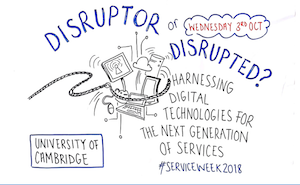
Cambridge as a disruptor
The event was opened by Professor Andy Neely, Founding Director of Cambridge Service Alliance, and Pro-Vice-Chancellor for Enterprise and Business Relations at the University of Cambridge. Emphasising the role of Cambridge as an environment that has stimulated ‘disruptive’ discoveries, ideas and innovations, he drew on examples from Darwin, to Watson and Crick, to Robert Edwards who pioneered conception through IVF. He also echoed the words of Stephen Hawking: “Remember to look up at the stars and not down at your feet.”
Digital developments in B2C services
Amazon Alexa provides a fascinating example of technological development disrupting business-to-consumer markets, so we were lucky to be joined by Craig Saunders, Head of Applied Science at Amazon Alexa Knowledge.
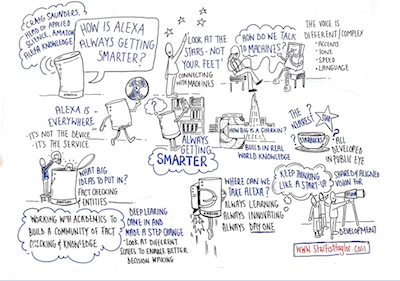
Craig talked about the technological challenges of developing a virtual assistant with human-computer interaction based on voice-recognition. Human vocal communication contains sophisticated and implied information that we learn to understand intuitively, but which must be unpicked for a computer to interpret. For example, if we ask Alexa “how tall is the Gherkin?”, Alexa needs to interpret not only the words used, but also the meaning to know that we are referring to the height of a building rather than the length of a pickled vegetable!
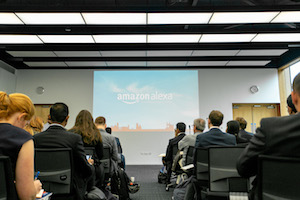
Alexa is the service, explained Craig, rather than a device. It is a virtual assistant that can be used across a range of devices and applications. Amazon has stimulated technology development for Alexa, by encouraging developers (in other companies or as individuals) to build and publish ‘skills’ using the Alexa Skills Kit. Once published, third party skills can be made available across Alexa-enabled devices. To date there are over 50,000 skills written by 325,000 developers.
Strategic shifts in B2B services
Insights into transformations in B2B services strategy were shared next on the agenda.
Sander Kuik, Director Services Delivery & Consulting at Canon Business Services in EMEA, talked about the journey of his organisation in shifting emphasis from products to services. He reflected on the term ‘disruption’ – implying a sudden or unexpected disturbance – and expressed the idea that most of the current change is more transition than disruption. Specific smart technologies are being identified and harnessed at Canon for their capacity to influence service capabilities, such as natural language processing to extract key data.
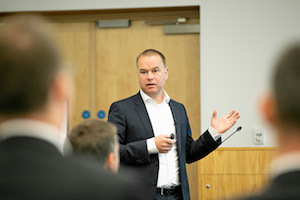
Sander also highlighted the value of building ecosystem partnerships to develop more effective services – for example to encourage innovation across ecosystems rather than relying on closed internal R&D for innovation. His key message was that the main disruption is not in technology but in organisation, governance and culture.
Following this, Homero Resendez, Head of Digital, CEMEX, talked about his organisation’s approach to delivering a ‘digital superior customer experience’. Central to the CEMEX strategy has been to offer customers an integrated end-to-end digital solution, so that customers have a seamless experience from the moment they place an order to when it is delivered and any follow up handled.
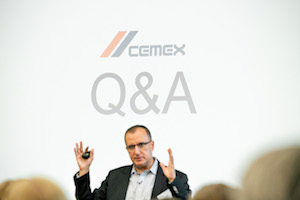
‘CEMEX Go’ is the e-commerce platform developed to deliver this service, the first end-to-end platform in the industry. Homero explained how and why the implementation of the platform required more than technical development; it required digital capabilities, and a digital culture. CEMEX is working towards a culture in which decision makers and employees have a ‘digital mindset’, with the willingness and capability to develop solutions in practice that solve customer needs.
Planning for the future
Next was an insightful keynote from Phil Wolfenden, Vice President, EMEAR, Cisco Customer Experience (CX), titled “Creating and harnessing exceptional customer value through a dedicated Customer Experience (CX) team and discipline”.
Phil pointed out that for Cisco, like other organisations, the disruption is coming less from competitors or from big economic change, and more from customers. Cisco has responded through a fundamental reorganisation in its Services and Customer Success organisation, both in how it is structured and also in its strategy and culture for engaging with customers.

Previously, Cisco had people with roles specialised according to places along the life-cycle. But, as Phil explained, this structure required skill from the customer to understand how to navigate and consume these services. Cisco has reconfigured with the customer genuinely as the centre of activity, renaming the business division ‘Customer Experience’ and working to deliver value at every step of the customer journey. The levels of support provided are tailored to how much support customers want and need, with service levels representing ‘do it myself’, ‘show me how’, ‘guide me how’ and ‘do it with/for me’.
Drawing inspiration from Doctor Who and the time lords, Phil’s central observation was that customers really want time. They want things to be easier so they get their time back. If the business can be built around enabling customers to regain time, it can be more truly customer-focused.
Insights from research
After lunch, Dr Mohamed Zaki from Cambridge Service Alliance explored ‘Customer experience – challenges and opportunities in the digital era’. He considered how interactions take place in the digital realm, physical realm and social realm, and the complexity for companies transitioning between these realms.
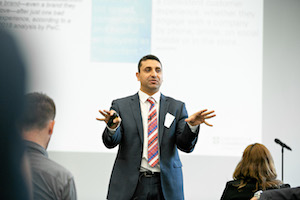
To visualise the interactions in these realms, Mohamed presented a cube with eight areas, in which there can be low or high complexity of digital, social or physical interaction. There are challenges to address with each of these areas.
For example, a high-social, low-digital, low-physical environment could be where customers are helping customers, with services like AirBnB. In this type of interaction the challenge is to achieve a balance of autonomy versus interdependence, with the need to build trust where the role of ‘trusted advisor’ rests on just another individual.
He presented different challenges for each of these eight areas, such as transparency vs privacy, standardisation vs flexibility, regulatory challenges, capabilities vs resources, and avoidance vs attraction.
The final sessions of the day involved interaction between delegates, with roundtable discussions to share thoughts and perspectives, and discuss key learnings from the day.
This was followed by a panel session with the keynote speakers and IfM’s senior industrial collaborators, giving an opportunity for everyone in the room to ask questions and listen to perspectives.
Getting involved
If you would like to be kept up to date with information from the Cambridge Service Alliance, do please visit here to complete the sign-up form.
Other events organised by the Cambridge Service Alliance in 2018 and 2019 include:
